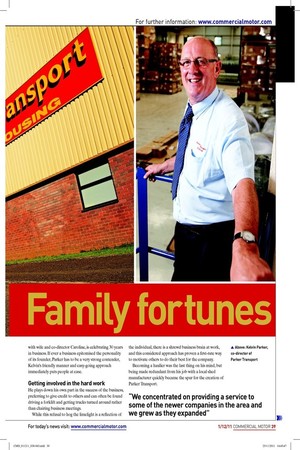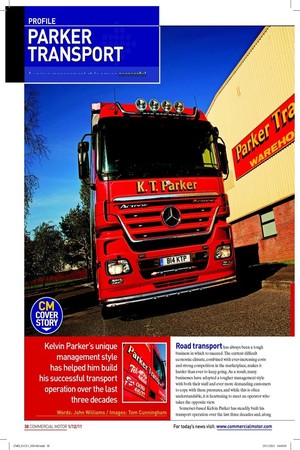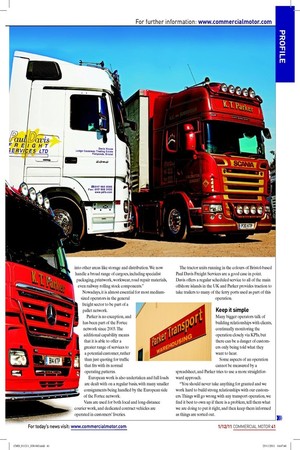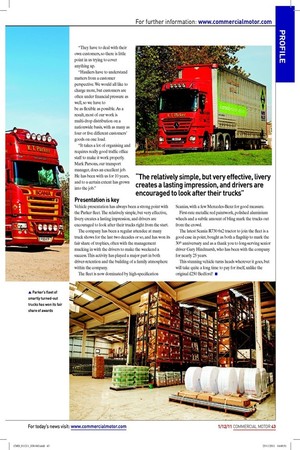Family fortunes
Page 25

Page 24

Page 26

Page 27

Page 29

If you've noticed an error in this article please click here to report it so we can fix it.
Road transport has always been a tough business in which to succeed. The current dif�cult economic climate, combined with ever-increasing costs and strong competition in the marketplace, makes it harder than ever to keep going. As a result, many businesses have adopted a tougher management style with both their staff and ever more demanding customers to cope with these pressures, and while this is often understandable, it is heartening to meet an operator who takes the opposite view.
Somerset-based Kelvin Parker has steadily built his transport operation over the last three decades and, along with wife and co-director Caroline, is celebrating 30 years in business. If ever a business epitomised the personality of its founder, Parker has to be a very strong contender, Kelvin’s friendly manner and easy-going approach immediately puts people at ease.
Getting involved in the hard work
He plays down his own part in the success of the business, preferring to give credit to others and can often be found driving a forklift and getting trucks turned around rather than chairing business meetings.
While this refusal to hog the limelight is a relection of the individual, there is a shrewd business brain at work, and this considered approach has proven a irst-rate way to motivate others to do their best for the company.
Becoming a haulier was the last thing on his mind, but being made redundant from his job with a local shed manufacturer quickly became the spur for the creation of Parker Transport. “I was given the chance to buy a vehicle and deliver goods for my old employer. This option was offered to a number of us, but I was the only one to take it up. I didn’t really have a clue what I was doing, but I was given some good advice and was able to make a go of it quite quickly.
“I borrowed £250 and bought a Bedford TK 7.5-tonner and went from there. It was right in the middle of the 1980-81 recession, there was little to lose and I just got on with it. I was able to pay the loan back in a month or two, things were so much different then. We slowly built up the business and took on more drivers, and some are still with me today. I often wonder just how much money we would have made if we had been as eficient back then as we have to be now.
“As the business prospered, we bought better vehicles and tried to look after them really well. We moved on to three-axle rigids and artics as the customer base expand ed. You have to respond to their demands, otherwise they will go elsewhere.”
A South Western base
The company has always been based in the Radstock/Midsomer Norton area, close to both Bath and Bristol, in the middle of the Mendip Hills, and now operates from three sites in the area.
The region was a centre for coal mining until the early 1960s. New industry was encouraged into the area when the pits closed, and many local hauliers had to adapt to meet the changing market, which offered opportunities for new entrants to the industry. In addition, there is a long tradition of paper, packaging and printing industries in the region, which created a big demand for transport.
“When we started, there was a number of larger operators working for the big paper and print manufacturers in the district. We couldn’t compete with them, so we concentrated on providing a service to some of the newer companies in the area and we grew as they expanded. A lot of the bigger manufacturers have either cut back or closed in recent years, which has had a knock-on effect on hauliers, but fortunately we have moved into other areas like storage and distribution. We now handle a broad range of cargoes, including specialist packaging, printwork, workwear, road repair materials, even railway rolling stock components.” Nowadays, it is almost essential for most medium sized operators in the general freight sector to be part of a pallet network.
Parker is no exception, and has been part of the Fortec network since 2003. The additional capability means that it is able to offer a greater range of services to a potential customer, rather than just quoting for trafic that its with its normal operating patterns.
European work is also undertaken and full loads are dealt with on a regular basis, with many smaller consignments being handled by the European side of the Fortec network.
Vans are used for both local and long-distance courier work, and dedicated contract vehicles are operated in customers’ liveries. The tractor units running in the colours of Bristol-based Paul Davis Freight Services are a good case in point. Davis offers a regular scheduled service to all of the main offshore islands in the UK and Parker provides traction to take trailers to many of the ferry ports used as part of this operation.
Keep it simple
Many bigger operators talk of building relationships with clients, continually monitoring the operation closely via KPIs, but there can be a danger of customers only being told what they want to hear.
Some aspects of an operation cannot be measured by a spreadsheet, and Parker tries to use a more straightforward approach.
“You should never take anything for granted and we work hard to build strong relationships with our customers. Things will go wrong with any transport operation, we ind it best to own up if there is a problem, tell them what we are doing to put it right, and then keep them informed as things are sorted out. “They have to deal with their own customers, so there is little point in us trying to cover anything up.
“Hauliers have to understand matters from a customer perspective. We would all like to charge more, but customers are often under inancial pressure as well, so we have to be as lexible as possible. As a result, most of our work is multi-drop distribution on a nationwide basis, with as many as four or ive different customers’ goods on one load.
“It takes a lot of organising and requires really good trafic ofice staff to make it work properly. Mark Parsons, our transport manager, does an excellent job. He has been with us for 10 years, and to a certain extent has grown into the job.”
Presentation is key
Vehicle presentation has always been a strong point with the Parker leet. The relatively simple, but very effective, livery creates a lasting impression, and drivers are encouraged to look after their trucks right from the start.
The company has been a regular attendee at many truck shows for the last two decades or so, and has won its fair share of trophies, often with the management mucking in with the drivers to make the weekend a success. This activity has played a major part in both driver-retention and the building of a family atmosphere within the company.
The leet is now dominated by high-speciication Scanias, with a few Mercedes-Benz for good measure.
First-rate metallic red paintwork, polished aluminium wheels and a subtle amount of bling mark the trucks out from the crowd.
The latest Scania R730 6x2 tractor to join the leet is a good case in point, bought as both a lagship to mark the 30th anniversary and as a thank you to long-serving senior driver Gary Hindmarsh, who has been with the company for nearly 25 years.
This stunning vehicle turns heads wherever it goes, but will take quite a long time to pay for itself, unlike the original £250 Bedford! n











































